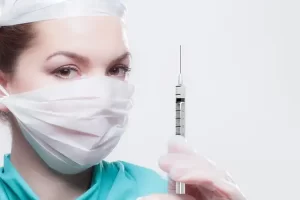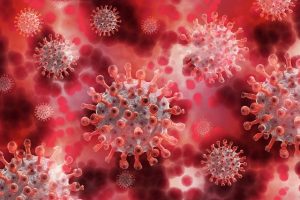Pfizer and BioNTech’s COVID-19 vaccine was received full FDA approval
- Mifepristone: A Safe and Effective Abortion Option Amidst Controversy
- Asbestos Detected in Buildings Damaged in Ukraine: Analyzed by Japanese Company
- New Ocrevus Subcutaneous Injection Therapy Shows Promising Results in Multiple Sclerosis Treatmen
- Dutch Man Infected with COVID-19 for 613 Days Dies: Accumulating Over 50 Virus Mutations
- Engineered Soybeans with Pig Protein: A Promising Alternative or Pandora’s Dish?
- Severe Fever with Thrombocytopenia Syndrome (SFTS): A Tick-Borne Threat with High Mortality
Pfizer and BioNTech’s COVID-19 vaccine was received full FDA approval.
- Israel new drug for COVID-19: EXO-CD24 can reduce deaths by 50%
- COVID-19 vaccines for children under 12 will be available soon
- French research: ADE occurred in Delta variant and many doubts on it
- Deer herds in U.S. are heavily infected with the new coronavirus (COVID-19)
Pfizer and BioNTech’s COVID-19 vaccine was received full FDA approval. On August 23, Pfizer/BioNTech’s COVID-19 vaccine was officially approved by FDA (for people over 16 years of age). This is a little earlier than the previously expected approval in September, which proves that the FDA is indeed mobilizing all of them this time and advancing at full speed.

Some people may be wondering whether all vaccines have been on the market for a long time, but are still being approved. Previously, the Pfizer/BioNTech vaccine was listed on the basis of the approval of the emergency use authorization at the end of 2020.
Emergency use authorization is for a special drug review channel under a public health crisis. The FDA will formulate specific standards according to the crisis. For example, for the COVID-19 vaccine, a very important standard is that at least half of the people in the phase III clinical trial have been vaccinated. Follow up for 2 months.
This is why we say that the emergency use of the COVID-19 vaccine has two months of phase three clinical trial safety data.
The 2-month follow-up of the emergency use authorization is not arbitrarily set, but because according to the safety studies of all previous vaccines, it is found that the adverse reactions basically appear within 2 months after vaccination. This is why we say that although it is a new vaccine and is for emergency use, the safety of the vaccine is fully guaranteed.
Today’s approval is the formal review and approval of Pfizer/BioNTech vaccine as a conventional medicine. Because vaccines are biological products, that is, macromolecular drugs manufactured through complex biological reactions, they are very different from small molecule chemicals such as aspirin, so the marketing application for vaccines is called BLA (Biological lisence application). The approval of the Pfizer/BioNTech vaccine application means that the BLA application they submitted was approved by the FDA.
BLA is no longer in the category of emergency use authorization, but is the review channel for conventional drugs. Its standard is for all biological drugs to be marketed, including all vaccines. The approval of the BLA of the Pfizer/BioNTech vaccine means that its effectiveness, safety, and production inspection data have reached the standard for the normal marketing of vaccines. It is compatible with the well-known MMR vaccine, polio vaccine, hepatitis B vaccine, HPV vaccine, etc. It belongs to the same status.
Compared with the previous emergency authorization, the amount of data is not the same. When Pfizer/BioNTech vaccine applied for emergency use authorization, all documents added up to more than 110,000 pages. Now the BLA application has reached 340,000 pages. What everyone is most concerned about is the effectiveness and safety data. The biggest difference in this regard is that the BLA application uses 6 months of tracking data from the Phase III clinical trial.
In other words, it is 4 months longer than the tracking time in the previous emergency use authorization. It should be noted that in terms of safety, no new problems were found during the 6-month follow-up period. It can be seen that the safety of the vaccine is guaranteed-even according to the safety standards of traditional vaccines on the market, it is still no problem.
Will there be any changes after the official listing? Pfizer/BioNTech has vaccinated more than 100 million people in the United States, and it is also one of the most widely used vaccines in the world. For many people, the title of “emergency use authorization” that it originally bears does not make much sense. However, the approval of the BLA will still bring some practical effects.
First, the most highly anticipated, but perhaps not very much in the end, is that for a vaccine that is officially approved, some people who hesitate to accept the vaccine will choose to accept it.
Indeed, some people will say “this is an emergency authorization, this is experimental” when explaining why they are unwilling to take the COVID-19 vaccine. In theory, if this is the reason, the current BLA approval will solve this problem. However, I personally doubt how much such people account for or whether they can be persuaded. To put it mildly, for some people, “there always will be something”.
Second, the formal approval will help enterprises, schools and other institutions to implement the compulsory vaccination policy.
With the rampant Delta, more and more American companies have begun to force their employees to be vaccinated against COVID-19. Although the Ministry of Justice and many legal scholars have pointed out that even for emergency use of authorized vaccines, it is okay to require compulsory vaccination, but this is a very controversial topic after all.
The official approval means that the COVID-19 vaccine no longer has a status difference from other vaccines. Since schools can require students to be vaccinated with MMR and hospitals can require employees to be vaccinated against influenza, there is no problem with compulsory vaccinations for the COVID-19 now.
So it can be expected that more mandatory vaccination requirements will appear in the United States recently. The U.S. Department of Defense also stated that it would formulate a policy of compulsory vaccination for military personnel after the news of the FDA approval came out.
Third, Pfizer/BioNTech will be able to market the vaccine.
According to the law, emergency use of authorized drugs cannot be used for marketing. Therefore, although advertisements for various drugs often appear on TV, it is impossible to have an advertisement for a certain COVID-19 vaccine. The health department can make general recommendations to encourage COVID-19 vaccination, but unlike commercial advertisements, it cannot involve specific products or even It is said that vaccination can prevent COVID-19 (because once it is said it will have the nature of medical advertising).
With the BLA approval, Pfizer/BioNTech can commercialize its COVID-19 vaccine like any listed drug.
Pfizer/BioNTech vaccine also has a trade name-COMIRNATY, which will be seen more in marketing and promotion.
In fact, I am quite curious. Most of the drug advertisements are extremely boring-one or two can be seen from the brand names of various drugs that are difficult to read and understand, and the gap with the high-end marketing of Budweiser in the Super Bowl. Basically it can be measured in light years.
The COVID-19 vaccine is a highly anticipated product. I don’t know if it can be a bit advanced in terms of advertising business capabilities. Of course, whether more marketing can drive more people to vaccinate is a more important question.
Fourth, from the perspective of vaccine use, drugs under emergency use authorization cannot be over-labeled.
The Pfizer/BioNTech vaccine approved in the emergency use authorization is two shots, so anyone can only get two shots. The doctor can’t say that based on my medical judgment, you can’t get two shots and you need to add one more shot. The previous additional injections for immunosuppressed people were implemented after the FDA revised the emergency use authorization content.
With BLA approval, the Pfizer/BioNTech vaccine is a common drug, and doctors can make off-label recommendations based on their own medical judgment. In other words, although there are two injections on the drug label, the doctor can recommend the patient to get the third injection. Since the United States has just announced its intention to implement enhanced injections for the general population on September 20, the third injection has become an issue of concern to the general public. Whether anyone will try to obtain the third injection through off-label drugs is worthy of attention.
It should be noted that the BLA approved the use of Pfizer/BioNTech vaccine for people over 16 years old. 12-15 years old is still authorized for emergency use, so this vaccine has become a common drug and is for people over 16 years old. Formal listing applications for 12-15 years old need to be done separately. If you look at the main time limit factor-6-month safety data, it will take a while. Clinical trials for children under the age of 12 are also ongoing and will not be affected by today’s BLA approval. Moderna’s BLA application has been submitted and is expected to be approved within a few weeks. Johnson & Johnson’s emergency use authorization is about 3 months later than the two mRNA vaccines. The data for six months of tracking has not yet come out. It is estimated that once enough data is collected and there are no accidents, it will apply for the same.
At the end of 2019, humans encountered the COVID-19 virus for the first time. The earliest COVID-19 vaccine entered clinical trials in March 2020. At the end of 2020, multiple COVID-19 vaccines showed good effectiveness, and now the first COVID-19 vaccine has been fully approved. In this limited time, billions of vaccines have been produced globally. Although the epidemic is still serious, the rapid development of science and technology has prepared the best weapon for us to fight against COVID-19, but whether we can use these equipment well in the end depends on the behavior of people themselves.
(source:internet, reference only)
Disclaimer of medicaltrend.org
Important Note: The information provided is for informational purposes only and should not be considered as medical advice.



